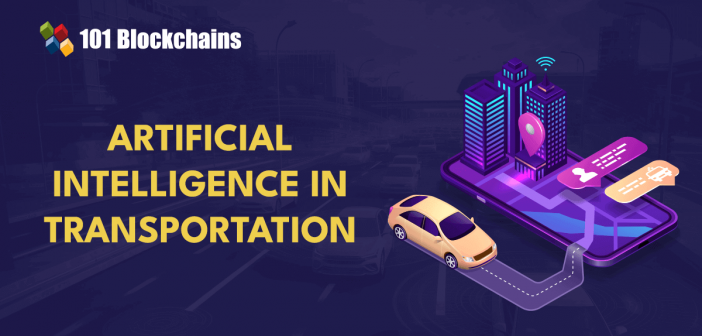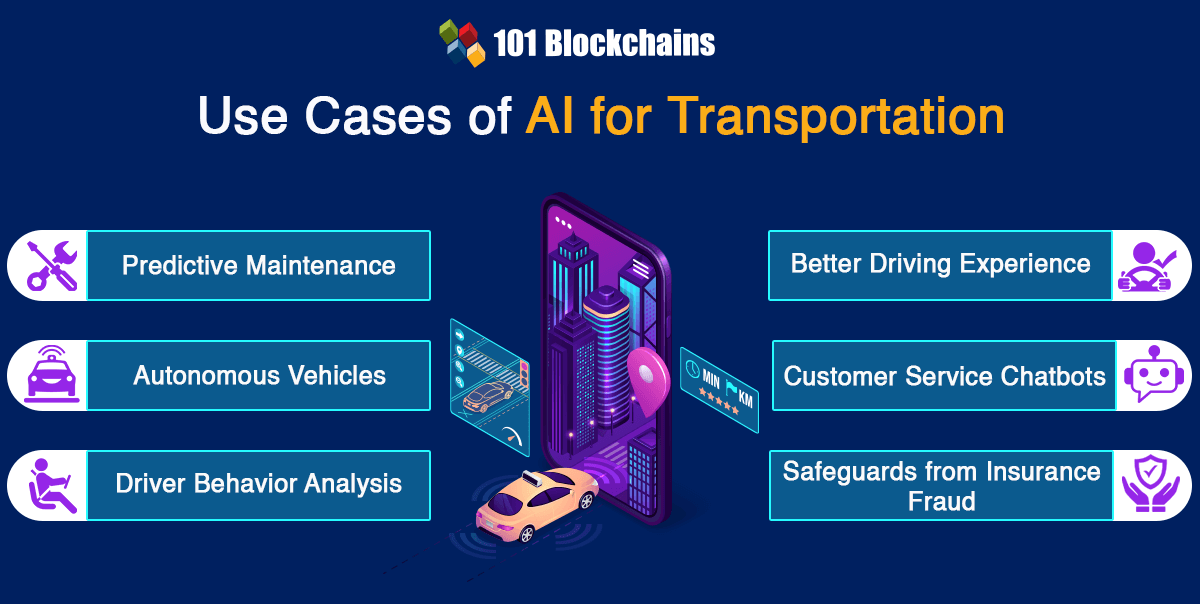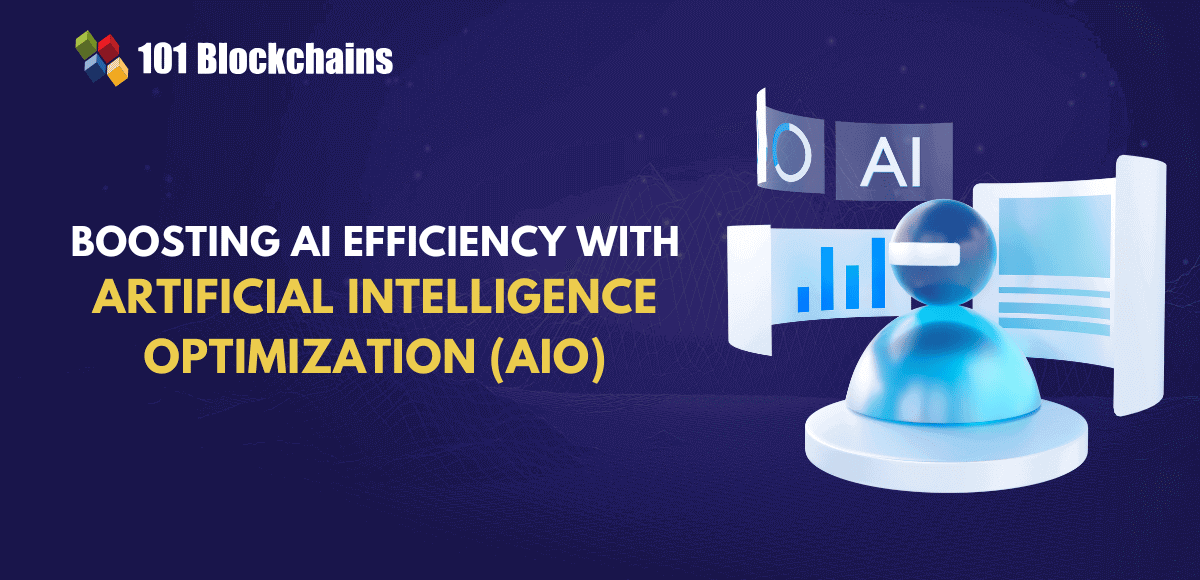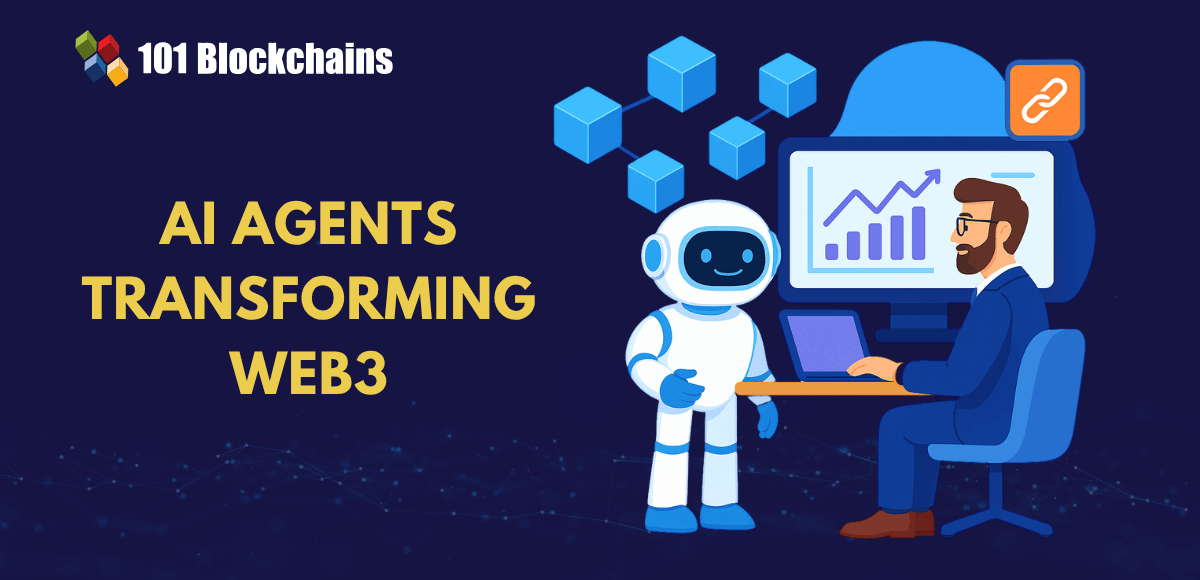Learn how blockchain truly works, master key definitions, and uncover what makes smart contracts so "smart." Dive into the fundamentals, gain valuable insights, and start your blockchain journey today!

- AI & ChatGPT
Georgia Weston
- on February 21, 2024
AI in Transportation: From Autonomous Vehicles to Smart Traffic Management Systems
The transportation industry has been through different stages of evolution, with different types of research, trials, and studies. Imagine the time when steamboats, bicycles, and motor cars were the only things people knew about transportation. The applications of AI in transportation have led to unprecedented changes where vehicles don’t even need human intervention to navigate around on the roads. Technical advancements have played a crucial role in shaping the course of innovation for the transportation industry. At this point of time, the use of artificial intelligence in transportation has helped to achieve major breakthroughs.
As a matter of fact, the global automotive AI market had a total capitalization of almost $3 billion in 2022. Artificial intelligence can revolutionize transportation through different use cases, such as autonomous vehicles and smart traffic management systems.
Artificial intelligence presents numerous benefits for the transportation industry. The outline of benefits of AI in transportation revolves primarily around autonomous vehicles. However, it is also important to look for other use cases of artificial intelligence in the domain of transportation. Let us learn more about the use cases of artificial intelligence for the transportation industry.
How Does AI Improve the Transportation Industry?
Artificial intelligence can bring a wide range of advantages to the domain of transportation. The review of AI in transportation examples shows that artificial intelligence revolutionizes the industry and offers value improvements for different aspects of the transportation industry. Artificial intelligence can open up many other opportunities with the use of technologies such as 5G, IoT, machine learning, big data analytics, and cloud computing. AI can help empower interconnectivity among vehicles, thereby designing safer, more efficient, and advanced transportation systems.
The role of AI in transportation has been restricted to the vision of creating self-driving cars. Autonomous vehicles can help in translating a futuristic vision into reality by offering a revolutionary transformation in the ways of perceiving and experiencing transportation. It could indicate a major advancement in transportation by moving beyond the concept of reaching a destination. Transportation would become a prominent ecosystem that can prioritize sustainability, safety, and convenience.
Artificial intelligence can help improve the transportation sector by reducing traffic congestion, overall financial expenses, and carbon emissions. It can also help in reducing the risks of accidents and increasing passenger safety. The answers to “How is AI used in transportation?” would help you identify how AI has helped the transportation industry achieve innovation.
Businesses in the transportation industry can capitalize on a broad array of benefits, such as personalized experiences and faster emergency responses. AI can not only provide autonomous vehicles but also smart traffic management solutions that can change the face of transportation. Here is an overview of the ways in which artificial intelligence can help in improving the transportation industry.
-
Faster Response to Emergencies
Artificial intelligence could send automatic alerts to emergency services in response to accidents, thereby improving the speed of response to emergencies.
-
Smarter Traffic Management
The outline of AI in transportation examples also focuses on smart traffic management for reducing traffic congestion. AI systems can guide drivers according to the different types of traffic levels in different locations.
-
Personalized Experiences
Artificial intelligence can help improve transportation by ensuring personalization of infotainment systems in vehicles. The outcomes of AI for personalization can be accurate and contextually relevant by accounting for the needs and preferences of drivers.
-
Enhanced Connectivity
The use of artificial intelligence in transportation can play a vital role in improving interconnectivity between vehicles and other devices and systems in proximity. As a result, the journey and experience of passengers could become more efficient and comfortable.
-
Better Convenience
Artificial intelligence can help in automation of route planning and navigation, which would help drivers focus on other aspects. It would help in making the driving experience more enjoyable and convenient.
-
Optimization of Insurance Process
The role of AI in transportation industry also emphasizes the optimization of insurance process by supporting automotive insurance companies in identification of risks. As a result, insurance companies could ensure accurate calculation of premiums and detection of fraud.
-
Reduction in Number of Accidents
AI systems could offer real-time updates to drivers about potential hazards and traffic conditions. Therefore, drivers can have contextually relevant information about road safety and avoid potential accidents.
Excited to learn the fundamentals of AI applications in business? Enroll now in the AI For Business Course
What are the Use Cases of AI for Transportation?
The search for benefits of AI in transportation would help you come across different aspects in which artificial intelligence changes transportation. AI can help in optimization of traffic management and improving vehicle safety. More organizations in the transportation industry are welcoming AI in different forms. Here are some of the top use cases of AI for transportation that prove how artificial intelligence can revolutionize transportation.

-
Predictive Maintenance
One of the foremost additions among the use cases of AI in transportation is predictive maintenance for transportation infrastructure and vehicles. Artificial intelligence can help in detection of underlying issues in vehicles and ensure proactive mitigation strategies.
Comprehensive analysis of historical and real-time data with AI systems can help forecast potential issues with vehicles or transportation infrastructure. As a result, AI can help implement proactive maintenance to reduce the risks of vehicle breakdowns and downtime. The value of predictive maintenance helps in enhancing safety alongside improving cost savings for transportation businesses.
-
Autonomous Vehicles
The use cases of artificial intelligence in the domain of transportation would be incomplete without referring to autonomous vehicles. You can find answers to “How is AI used in transportation?” in the rising demand for self-driving cars or autonomous vehicles. The concept of self-driving cars might have been a fantasy element of science fiction novels and movies a few years ago.
However, autonomous vehicles have become closer to reality than ever. Tokyo is one of the best examples of the vision of self-driving cars running effortlessly on the road. Self-driving cars work by using machine learning and advanced sensors to perceive and respond to the surrounding environment. Autonomous vehicles can become a norm in the future and deliver promising advantages in the long run.
-
Driver Behavior Analysis
The next use case of AI in the field of transportation points to AI-based analytics for behavior of drivers. It could play a vital role in enhancing transportation safety. Devices with the power of AI algorithms could serve as prominent additions among AI in transportation examples with the benefits of monitoring different factors of driver behavior.
The notable aspects of driver behavior monitored by AI systems include braking, fuel consumption, speeding, harsh acceleration, vehicle downtime, and oil change intervals. AI can also help check drivers’ adherence to traffic rules. Such types of data pointers serve invaluable outcomes for effective fleet management, promoting safer driving habits and optimization of insurance pricing models.
Enroll in our Certified ChatGPT Professional Certification Course to master real-world use cases with hands-on training. Gain practical skills, enhance your AI expertise, and unlock the potential of ChatGPT in various professional settings.
-
Better Driving Experience
Artificial intelligence has been transforming driving experiences and driver safety by utilizing intelligence systems to monitor road conditions and driver behavior. Modern vehicles can utilize computer vision, IoT sensors, and emotion recognition in transportation to identify driver behaviors that could create potential risks.
The benefits of AI in transportation can also point to how AI could determine whether the driver is in a potentially hazardous condition. AI could help in analysis of different factors such as body temperature, time, fatigue, driving behavior, eye movement, and sleepiness. For example, advanced driver assistance systems or ADAS could utilize AI algorithms for detection of potential hazards and real-time alerts for drivers.
-
Customer Service Chatbots
Another prominent use case of artificial intelligence in transportation is customer service chatbots. AI-based chatbots have refined the conventional approaches for interaction between businesses and customers. The chatbots have natural language processing or NLP capabilities that help in understanding and responding to user queries about features of vehicles.
Such chatbots could offer information alongside providing support for resolving problems. AI chatbots could replace the repetitive tasks of employees in the transportation industry, such as selection of car models, collection of customer feedback, and scheduling of test drives. AI-based chatbots could help companies enhance the efficiency of customer service, reduce response times, and deliver personalized user experiences.
-
Safeguards from Insurance Fraud
The transportation sector is highly vulnerable to insurance fraud, and insurance companies have to pay billions of dollars for fraudulent claims. Artificial intelligence combined with NLP serves a major role in fighting against insurance fraud. The role of AI in transportation revolves around the capability of AI algorithms to analyze massive volumes of data and identify anomalous patterns.
The anomalous patterns help in detecting suspicious activities that could help insurance companies follow proactive measures to fight against fraudulent claims. As a result, insurers could save resources, maintain their reputation, and reduce financial losses. With the value benefits of AI in insurance fraud detection, insurers could leverage the benefits of streamlined claims processing and improved accuracy. It also helps in building trust between policyholders and insurance companies.
Identify new ways to leverage the full potential of generative AI in business use cases and become an expert in generative AI technologies with Generative AI Skill Path
How Will AI Transform Traffic Management?
The use cases of artificial intelligence for transforming the transportation industry point towards the popularity of autonomous vehicles. However, the answers to “How is AI used in transportation?” draw the limelight on smarter traffic management solutions. You must have come across scenarios where the lack of traffic management led to disastrous consequences. The effect of artificial intelligence on traffic management would involve references to the following implications.
-
Real-time Traffic Monitoring and Analysis
The use cases of AI for traffic management revolve around capabilities of AI for real-time traffic monitoring and analysis. Artificial intelligence can help achieve effective traffic flow prediction, adaptive traffic signal control, and incident detection and management. The benefits of AI in transportation for traffic flow prediction involve designing AI models for running analysis on real-time and historical traffic data. Predictive analytics and adaptive traffic signals could help in aligning with the variations in demand.
-
Intelligent Transportation Systems
The next crucial category of use cases of AI in transportation points at Intelligent Transport Systems or ITS. Such types of systems can help introduce smart improvements in transportation through continuous monitoring of demand, accidents, and weather conditions.
Connected and autonomous vehicles are one of the major drivers of ITS by ensuring exchange of information with nearby vehicles. The data shared by vehicles include important parameters such as speed, braking, positioning, and acceleration. It can help reduce collisions and real-time congestion notifications alongside ensuring route optimization, among other crucial applications.
Want to understand the importance of ethics in AI, ethical frameworks, principles, and challenges? Enroll now in Ethics Of Artificial Intelligence (AI) Course
-
Traffic Optimization
Artificial intelligence solutions can also help improve traffic optimization by using traffic prediction models, machine learning models, and digital twins. The outline of AI in transportation examples for traffic optimization involves traffic prediction models. The traffic prediction models can utilize historical and real-time data regarding traffic flow, commute times, and congestion levels to obtain reliable and accurate predictions.
-
Optimization of Traffic Route
Drivers could also leverage AI-powered navigation applications to change the way they find directions when they travel. The apps can utilize real-time traffic data from different sources, such as traffic sensors, user-generated data, and GPS signals. It could help in ensuring dynamic rerouting of vehicles according to the specified conditions. AI-based systems can help ensure better navigation through the capabilities of a system of interconnected networks and devices. The systems can help in supporting services that could have a direct or indirect impact on traffic conditions.
Develop expert-level skills in prompt engineering with the Prompt Engineer Career Path
Conclusion
The benefits of AI in transportation are one of the most convincing reasons to choose AI for improving transportation industry. Artificial intelligence can help in improving the transportation sector by offering the foundation to create autonomous vehicles and smarter traffic management. On top of it, AI could also improve transportation by enhancing automated incident response management, optimizing routes and navigation, and providing better driver experiences.
Therefore, AI has not only improved the convenience of drivers but also ensured their safety from accidents. On top of it, artificial intelligence can make navigation easier and help the transportation industry fight against insurance fraud. Learn more about the benefits of artificial intelligence for improving the transportation sector right now.






